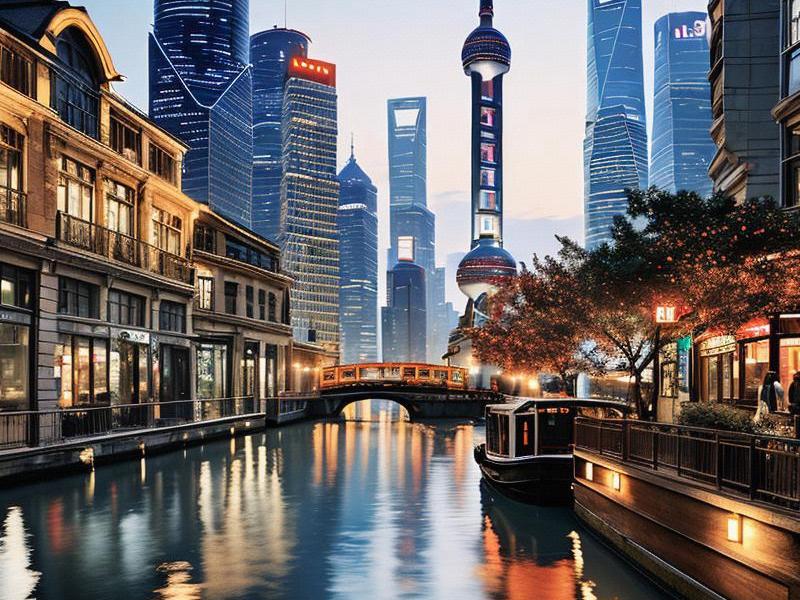
Shanghai, often referred to as the "Pearl of the Orient," stands as a testament to China's remarkable transformation over the past century. This vibrant metropolis, with its skyline punctuated by iconic skyscrapers and its streets alive with the hum of activity, is a city where the old meets the new in the most extraordinary ways.
The Bund, a historic waterfront area, is a prime example of Shanghai's ability to blend tradition with modernity. Once the financial hub of colonial Shanghai, the Bund is now a popular tourist destination, offering breathtaking views of the futuristic skyline across the Huangpu River. The juxtaposition of the neoclassical architecture of the Bund against the sleek glass towers of Pudong is a visual representation of Shanghai's evolution.
Pudong, on the other side of the Huangpu River, is where Shanghai's modern face is most evident. Home to the iconic Oriental Pearl Tower, the Jin Mao Tower, and the Shanghai Tower, Pudong is a symbol of the city's ambition and drive towards becoming a global financial center. The Lujiazui Financial District, with its concentration of multinational corporations and financial institutions, is the beating heart of Shanghai's economy.
However, Shanghai's story is not just one of skyscrapers and stock exchanges. The city is also a treasure trove of cultural heritage, with neighborhoods like Zhabei, Hongkou, and Yangpu preserving the essence of old Shanghai. These areas are dotted with Shikumen (stone gate) houses, a unique architectural style that dates back to the 19th century. Walking through these narrow alleys, one can feel the pulse of history and the whispers of the past.
爱上海同城对对碰交友论坛 Cultural fusion is at the heart of Shanghai's identity. The city has long been a melting pot of different cultures, thanks to its status as a major port and its history of being a haven for Chinese seeking refuge from political turmoil. This cultural diversity is reflected in the city's cuisine, art, and festivals. From the spicy flavors of Sichuan cuisine to the delicate taste of Suzhou silk, Shanghai offers a culinary journey that is as diverse as its people.
The city's art scene is equally vibrant, with galleries and museums showcasing both traditional Chinese art and contemporary works. The Shanghai Museum, with its extensive collection of ancient Chinese art, is a must-visit for art enthusiasts. Meanwhile, the M50 Creative Park, located in the former site of a textile factory, has transformed into a haven for contemporary artists, attracting visitors from around the world.
Festivals in Shanghai are a celebration of this cultural blend. The Shanghai International Film Festival, one of the oldest film festivals in Asia, attracts filmmakers and cinephiles from all over the globe. The Dragon Boat Festival, with its dragon boat races and the tradition of eating zongzi (sticky rice dumplings), is a vibrant reminder of Shanghai's Chinese heritage.
上海龙凤阿拉后花园 Innovation is another cornerstone of Shanghai's success. The city has been at the forefront of China's technological advancements, with its tech parks and incubators fostering the growth of startups and established companies alike. Zhangjiang Hi-Tech Park, often referred to as "China's Silicon Valley," is home to some of the country's leading technology firms and research institutions.
Shanghai's commitment to sustainability is also noteworthy. The city has invested heavily in green technologies and sustainable urban planning. The construction of the Hongqiao Transportation Hub, which integrates high-speed rail, metro, bus, and taxi services, is a model of efficient and environmentally friendly transportation. The city's green spaces, such as Century Park and the Yuyuan Garden, provide residents and visitors with tranquil oases amidst the urban sprawl.
Education is a key driver of Shanghai's development. The city boasts some of the best universities in China, including Fudan University and Tongji University, which attract students from across the country and abroad. These institutions are not only centers of academic excellence but also hubs of research and innovation, contributing to the city's intellectual capital.
上海夜生活论坛 Shanghai's international outlook is further exemplified by its role in global affairs. As a member of the World Expo Organizing Committee, the city successfully hosted the World Expo in 2010, an event that showcased its ability to organize large-scale international events and its commitment to global cooperation. The Expo's theme, "Better City, Better Life," resonated with the challenges and aspirations of urbanization worldwide.
Despite its rapid development, Shanghai remains deeply connected to its roots. The city's efforts to preserve its historical sites and cultural heritage are a testament to its commitment to maintaining its unique identity. Initiatives such as the restoration of the former French Concession and the preservation of the Nanshi Food Street reflect the city's balance between progress and tradition.
In conclusion, Shanghai is a city that embodies the spirit of China's modernization while honoring its rich cultural heritage. Its dynamic blend of innovation, tradition, and urban development makes it a unique and fascinating place to explore. Whether you are drawn to its historical landmarks, its vibrant cultural scene, or its cutting-edge technology, Shanghai offers an experience that is truly one of a kind.
As Shanghai continues to grow and evolve, it remains a beacon of what is possible when tradition and modernity coexist in harmony. The city's story is one of resilience, adaptability, and a relentless pursuit of excellence, making it a shining example of the future of urban living.
